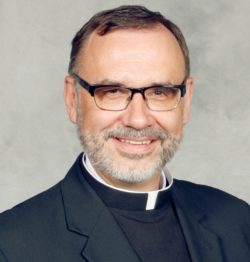God First: In Our Minds, Actions, and Interactions
31st Sunday of Ordinary Time – Year B
Everyday the Jewish people pray the Shema in the morning and the evening. Jesus Himself prayed the Shema from a young age. The Shema is this prayer:
“Hear, O Israel! The LORD is our God, the LORD alone! Therefore, you shall love the LORD, your God, with all your heart, and with all your soul, and with all your strength.”
In the Book of Deuteronomy the prayer continues:
“Take to heart these words which I enjoin on you today. Drill them into your children. Speak of them at home and abroad, whether you are busy or at rest. Bind them at your wrist as a sign and let them be as a pendant on your forehead.”
These words are at the heart of Judaism’s profession of faith. For this reason, orthodox Jews take this indication very seriously. They have the words of the Shema written on little scrolls of parchment that are rolled up, and put into little boxes. These boxes are then attached to the phylacteries that Jewish men wear on their left wrists and foreheads. A parchment scroll with the Shema prayer is also placed in a special container called a mezuzah, which is hung on Jewish families’ doorposts. They do all these things so that the Jewish people will never forget this first commandment.
Jewish men place the phylactery on their foreheads as a sign that their minds should be full of love. They place them in their hands as a reminder that their actions should be full of love for God. And they place them on their doorposts as a reminder to them and their families that all of their social lives and interactions with others should be directed toward this commandment of love.
In our modern and secular world, these Jewish customs are a beautiful reminder not only that we should love God with all of our hearts, souls, strength and mind, but also that God Loves us with all of his heart, soul strength and mind. He Loves us with all that He is, because in Jesus Christ, God gave His life for us on the Cross.
So often, my brothers and sisters, we place other things such as money, jobs, people, comfort, sports and possessions before God. We do not love Him with all of our being. We close off our hearts to His love and, therefore, cannot receive His Love in return. God does not want us to love Him with all our being simply because He wishes to place a burden on us or enslave us—no. God wants us to love him with all that we are because He wants to bestow on us His Love in return—because true love gives life sense and meaning. When we love and are loved by someone, especially God, then our lives are more beautiful, happier and fuller.
Yours in Christ,
Father Arthur
Readings for the 31st Sunday in Ordinary Time: Lectionary 152
Tags: #arturmarat, #frarthurmarat, #olw, #olwparish, #reflection, #sight



Comments are closed here.